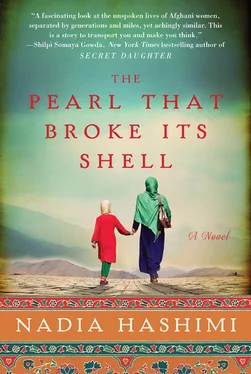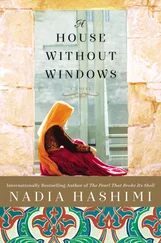“Then we will arrange it,” Hafizullah declared. “I will speak to the general so that we can make the entourage aware of the gift before you present her to King Habibullah. This is a historic visit to our town and you will be making a mark. You can expect this to bring you many returns, I believe.”
Shekiba had heard enough. She walked back to the kitchen, her legs wobbly beneath her. Her head was spinning.
The king? The palace?
Words that were foreign to her.
Shekiba, the half face. The girl-boy who walks like a man.
Shekiba was not a whole anything, she realized.
Khala Shaima liked to keep us hanging. I wondered what would happen to Bibi Shekiba almost as much as I wondered what would happen to us. It seemed that we were both about to leave our homes.
Padar- jan spent more time away from home in the following weeks. When he did return, he scowled and barked orders more. Even Parwin’s soft singing, which he usually secretly enjoyed, provoked him. Madar- jan tried to keep him placated with ready meals and a quiet home but he inevitably found another reason to explode.
I spent more time at Agha Barakzai’s shop. It was my way of avoiding the guys without explaining what was happening. I worried that my mother was going to change me back into a girl and I wondered how Abdullah and Ashraf would react. I hated to be away from them, mostly Abdullah, but I was scared to be with them, too.
I lay awake at night, thinking about Abdullah and remembering the day Madar- jan had caught us play-fighting. Until the moment she called my name, it had been thrilling. I tingled to think of Abdullah’s face over mine, his long legs trapping my hips under him, his hands pinning my wrists. And his grin. I blushed in the dark.
I tried to make up to Madar- jan for what I had done. I tried to keep Padar- jan distracted from her, even if it meant him yelling at me. Even though I’d been relieved of housework when I became a bacha posh, I tried to help when I saw her washing clothes or beating the dust from the carpets.
Shahla didn’t say more than a few words to me every day. She was still upset and could sense from Madar- jan ’s mood that trouble was brewing. She was quiet around Padar- jan, bringing him tea or food and leaving the room before he could realize she was one of those young women he had kept home for too long.
My grandmother stopped by more often. She was intrigued by the new wave of unrest in our home and wanted to see it for herself. Madar- jan tried to be as polite as she could.
“Tell my son that I want to talk to him. When he gets home, make sure he comes to see me.”
“Of course. What is it that you want to talk to him about?”
“Is it any business of yours? Just tell him what I’ve asked.”
Madar- jan knew what the topic was. Maybe this time her husband would be more interested in bringing another wife home.
I listened in when Padar- jan went to see his mother. I pretended to be playing with a ball in the courtyard and slowly kicked it further and further until I was right outside my grandmother’s living room. I heard her shrill voice loud and clear. My father, mumbling at times, was more difficult to make out.
“ Bachem, it’s high time. You’ve given her plenty of opportunity to give you a son and she’s failed. Now, let’s bring a second wife for you so that you can finally expand this family.”
“And where am I going to put her? We have one room for all the girls as it is. There’s no money to build another space behind our home or to buy something else in town. I can always find a new wife. It’s the space and money that are harder to come by.”
“What about Abdul Khaliq? Hasn’t he promised to help you when you need?”
Padar- jan shook his head.
“The men are short on weapons, on supplies. There isn’t money to spare.”
“Psht. The hell there isn’t money. I’ve heard what he does. I’ve heard from the people in town about his horses, his wives, all his children. He’s got plenty!”
“Madar! Be careful what you say! He’s a powerful man and don’t be part of any loose talk about him. Do you understand me?”
“I’m not the one starting this talk. There are lots of tongues flapping about him. That’s all I’m trying to tell you,” she said, annoyed to be silenced by her son.
“Anyway, I’ll be making some changes at home soon and things will be easier on my pockets. It’s time I relieved myself of some of these girls.”
“And how do you expect to do that?”
“Just watch what Raisa does while I’m gone and I’ll find a way to take care of the rest.”
Shahla and Madar- jan were right. Padar- jan was about to shake up our home.
Eleven days later, Abdul Khaliq showed up at our home with seven other men. They pulled up in two black SUVs, their tires leaving clouds of dust in the street. Abdullah saw the car and knew immediately who they belonged to. Most people in our town traveled on foot.
It was my cousin Muneer who opened the front gate and pointed out our home. Not even my father was expecting him. Muneer watched openmouthed as Abdul Khaliq and his entourage walked by. Two men had black guns slung over their shoulders. Abdul Khaliq was a burly man in his late forties, judging by the lines around his eyes and the gray in his beard. He wore a white turban and a beige tunic over loose pants. An antenna stuck out from the pocket of his gray vest, another sign that this man was something other than common folk. He was the first person in our town to own a mobile phone. Few had access to any phone at all.
We usually sent one of the men to the front gate to greet a visitor. People didn’t just barge in, since the women of the home could be wandering about the courtyard without their head coverings. But it was either Muneer’s stupidity or Abdul Khaliq’s presence that changed things from the usual routine. He and his men were in our courtyard, their eyes assessing the situation. I caught sight of them and recognized Abdul Khaliq from the bazaar. I darted inside to warn my mother and send my father out to meet his friend.
“Padar- jan, Abdul Khaliq is here — with a lot of people.”
My father sat up straight and pushed his newspaper aside. “What are you talking about? Where?”
“Out there. In the courtyard. He’s got seven men with him. And guns.”
My father’s brow furrowed. He got to his feet faster than usual.
“Tell your mother to prepare something for our guests,” he said, and went outside to meet the warlord.
Madar- jan heard us and stood in the kitchen looking disturbed. She shot a look at the doorway to our bedroom, where Shahla and Rohila were putting Sitara to sleep. Parwin was peeling onions at Madar- jan ’s feet. She was the only one whose eyes didn’t sting and tear when the layers came off.
“He’s going to want more than tea,” Parwin predicted without looking up.
Madar- jan looked at Parwin almost as if she heard some prophesy in her daughter’s words. She bit her lip and took out some cups.
“Bring these to them, Rahim- jan, ” she said nervously.
I took the tray and willed my hands not to shake. I could feel their eyes boring into me when I entered the room, their conversation suddenly pausing. The men had spread out, Abdul Khaliq sitting on the cushion across from my father, his fingers nimbly working a string of prayer beads as he leaned back. On either side of him sat older men, more gray in their beards than black. The armed men were closest to the door. I didn’t look at their faces and tried to keep my gaze off their weapons as well. Kneeling, I put a cup in front of each person and backed out of the room as quickly as I could to listen from the hallway. Madar- jan was doing the same.
Читать дальше












